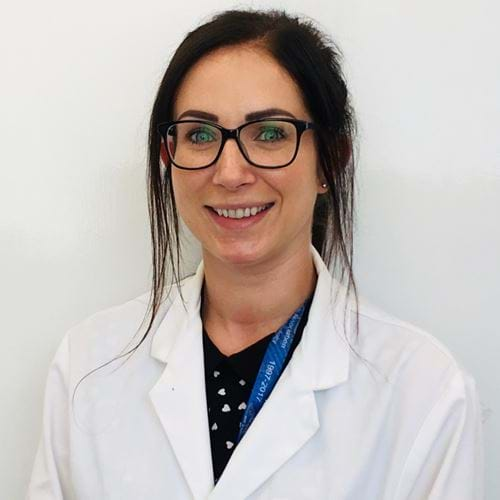Pause carousel
Play carousel

"Abertay has a real family feel to it. I liked that the lecturers knew every student by name and that they genuinely cared about students reaching their potential."Nicola Robson | Pathology Department, NHS Tayside | Specialist Biomedical Scientist
The Biomedical Science degree at Abertay is delivered by a combination of academics and healthcare professionals, and because of this you get the best of both worlds. With the academics, you are taught specifics in biology (for example, physiology, cell function and genetics) via lectures and lab practicals. With the healthcare professionals, you are given an insight into their specialty (for example, pathology, haematology, microbiology, etc) whilst also being given real examples and experiences of working in a laboratory. They also advise about the relevant professional and regulatory bodies and legislation etc which is really helpful.
Alongside this, students are given the opportunity to apply for an 18-week clinical placement as part of the BSc (Hons) Applied Biomedical Science route. For these students, this means half of your 3rd year is spent in an NHS diagnostic laboratory, gaining valuable work experience, making connections, and completing a registration portfolio which makes you eligible to apply for NHS Biomedical Science jobs upon graduation.
Abertay has a real family feel to it. It is not the largest uni in the world, and I liked that. I liked that the lecturers knew every student by name and that they genuinely cared about students reaching their potential.
As a Specialist Biomedical Scientist in NHS Tayside's Pathology Department, I handle a wide range of human tissue specimens at all stages of their journey through the lab, with the aim of providing pathologists with high quality material in order for them to make an accurate diagnosis for the patient. This involves careful handling of tissue specimens, chemicals and equipment.
I was very lucky that a post for a Trainee Specialist Biomedical Scientist in the same lab I carried out my clinical placement was advertised a month before I was due to finish uni. I applied for it and attended the interview 3 days before my final exam. I was offered the job on the understanding that I passed my exams (and therefore obtained my degree). 2 months after that exam, once the results were confirmed and the paperwork was completed, I started my post.
My honours project, Perceptions of Biomedical Science, was published in the journal, The Biomedical Scientist, just a few months after graduation. This would not have been possible without the help of my supervisor (and programme leader), Kevin Smith. But it is definitely not something I thought I would ever achieve, and it is something I am very proud of.
Biomedical Science is changing all the time therefore we are still always learning new techniques as science advances. So, it was a bit of a shock at first but now I am used to it and I enjoy it. Learning never stops in this job, and that’s one of the reasons it is so interesting. At the moment I’m not sure which way Id like to go, but what I do know is there are options to explore, and I find that very exciting.